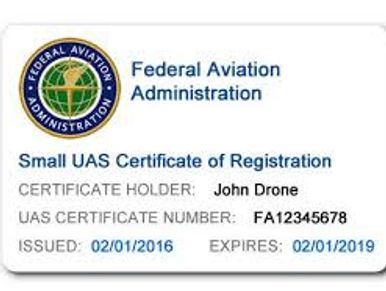FAA Rules for R/C and Drone Pilots
R/C Aircraft and Drones are regulated by the FAA

The Federal Aviation Administration (FAA) has defined a small Unmanned Aircraft System (sUAS) as a small remote controlled aircraft controlled by a ground based transmitter or an autopilot. This includes traditional R/C model aircraft and drones over 8 ounces in weight. Small unmanned aircraft and drones may be operated for hobby and recreational purposes as long as specific safety guidelines are followed. Pilots of these aircraft are referred to as "Remote Pilots".
Remote Pilot Registration
All R/C and Drone pilots must register with the FAA. To register you must be 13 years of age or older and have a valid email address to verify your account. If you are not 13 years old, a parent or guardian must register for you.
Recreational Pilot Test

The FAA began online testing of recreational R/C and drone pilots on June 1, 2021. There's no charge for the test and you cannot fail. The FAA UAS Safety Test is admininstered the Academy of Model Aeronautics (AMA).
Where can I fly?
The FAA’s B4UFLY service shows where recreational flyers can and cannot fly. Starting February 1, 2024, recreational flyers who only fly their drone for fun have several resources to choose from. The FAA has approved four companies to provide B4UFLY services through desktop and mobile applications. B4UFLY provides situational awareness to recreational flyers and other drone users. The app provides situational awareness, but it does not allow users to fly in controlled airspace or with 5 miles of major airports.
Remote ID
Know Before You Fly!
On September 16, 2023 the FAA implemented a rule that requires Remote ID equipment on all sUAS aircraft and drones operating anywhere in the USA. sUAS aircraft and drones without Remote ID can only fly at FRIA designated flying sites.
Know Before You Fly!
Know Before You Fly!
For more information, visit the Know Before You Fly website. Know Before You Fly is an educational campaign that provides prospective users with the information and guidance they need to fly safely and responsibly. The campaign is organized by the Academy of Model Aeronautics (AMA), the Association for Unmanned Vehicle Systems International (AUVSI), and the Consumer Technology Association (CTA) in partnership with the Federal Aviation Administration (FAA).
Recreational vs. Commercial Drone Pilot
Low Altitude Authorization and Notification Capability (LAANC)
Low Altitude Authorization and Notification Capability (LAANC)
Recreational Pilots can fly for fun, but cannot earn any money from the activity. If you earn any money, no matter how small, you must register as a Part 107 Commercial unmanned pilot and pass an FAA knowledge test.
Low Altitude Authorization and Notification Capability (LAANC)
Low Altitude Authorization and Notification Capability (LAANC)
Low Altitude Authorization and Notification Capability (LAANC)
LAANC provices all sUAS or drone pilots with a way to request permission to fly at or below 400 feet in controlled airspace. It also provides an awareness of where pilots can and cannot fly.






